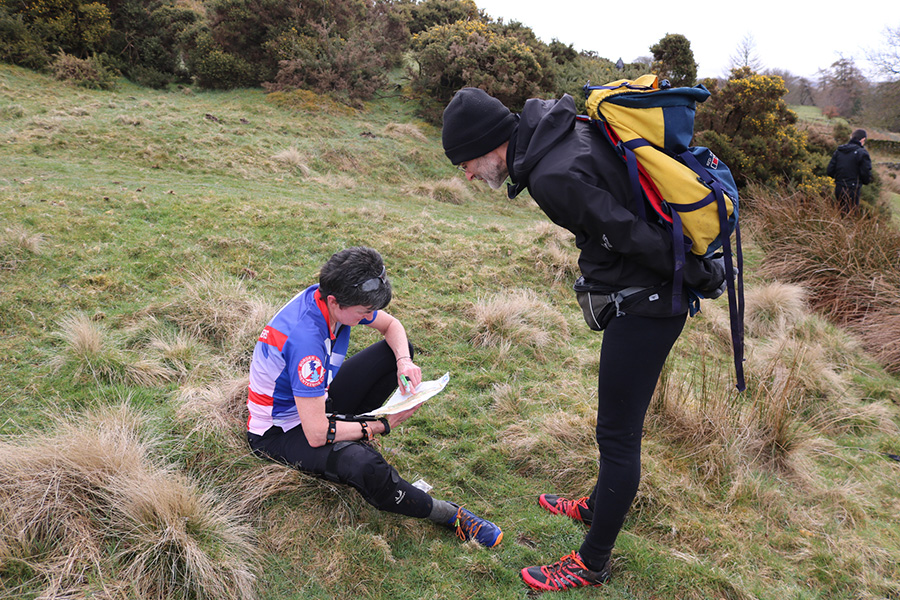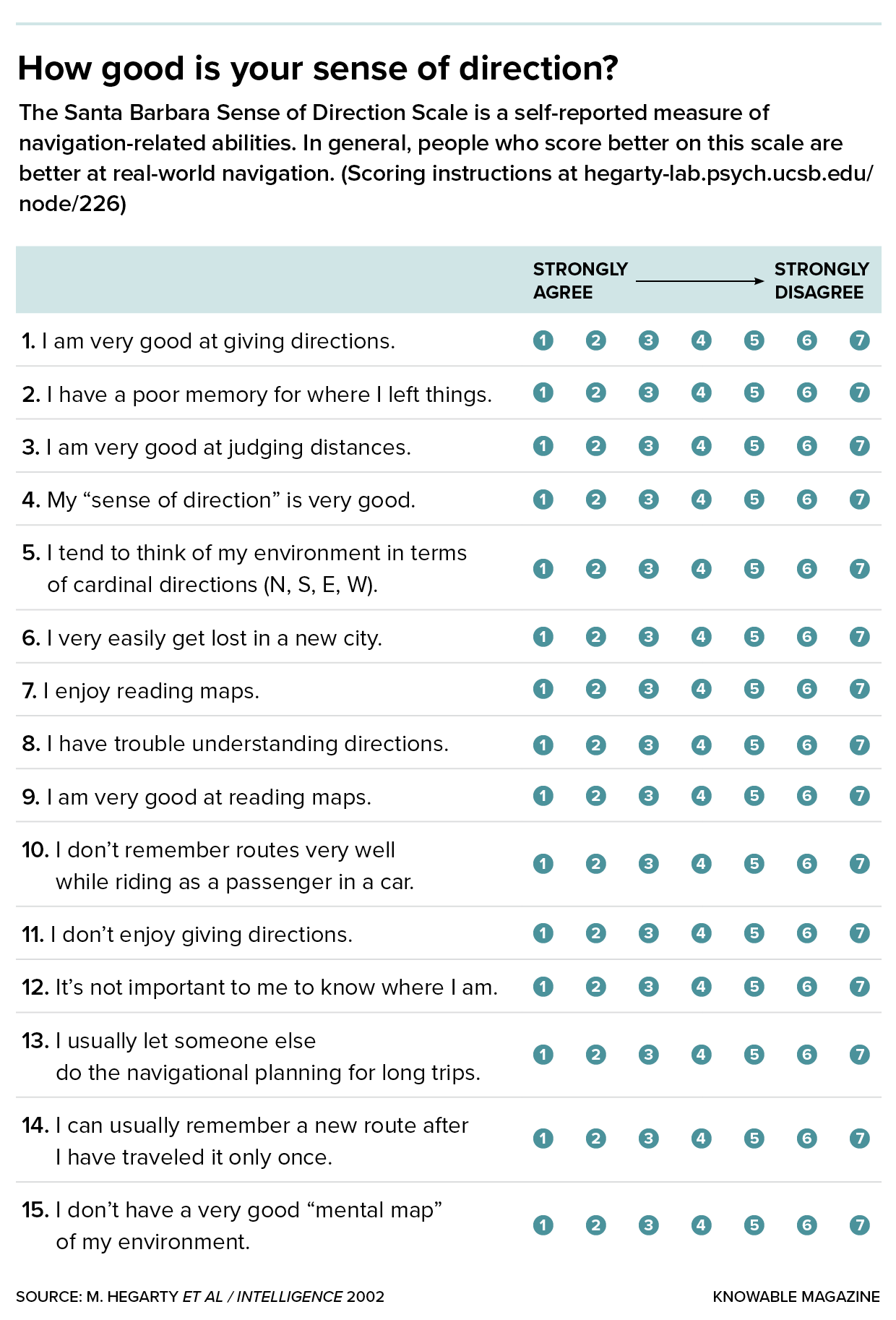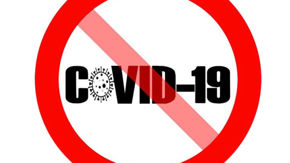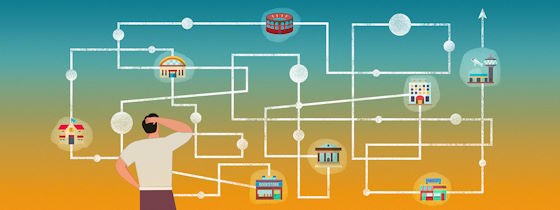Part 1 of 2. (Photo: Scientists are homing in on how navigation skills develop. Credit: KNOWABLE MAGAZINE)
Like many of the researchers who study how people find their way from place to place, David Uttal is a poor navigator. “When I was 13 years old, I got lost on a Boy Scout hike, and I was lost for two and a half days,” recalls the Northwestern University cognitive scientist. And he’s still bad at finding his way around.
The world is full of people like Uttal — and their opposites, the folks who always seem to know exactly where they are and how to get where they want to go. Scientists sometimes measure navigational ability by asking someone to point toward an out-of-sight location — or, more challenging, to imagine they are someplace else and point in the direction of a third location — and it’s immediately obvious that some people are better at it than others.
“People are never perfect, but they can be as accurate as single-digit degrees off, which is incredibly accurate,” says Nora Newcombe, a cognitive psychologist at Temple University who coauthored a look at how navigational ability develops in the 2022 Annual Review of Developmental Psychology. But others, when asked to indicate the target’s direction, seem to point at random. “They have literally no idea where it is.”
While it’s easy to show that people differ in navigational ability, it has proved much harder for scientists to explain why. There’s new excitement brewing in the navigation research world, though. By leveraging technologies such as virtual reality and GPS tracking, scientists have been able to watch hundreds, sometimes even millions, of people trying to find their way through complex spaces, and to measure how well they do. Though there’s still much to learn, the research suggests that to some extent, navigation skills are shaped by upbringing.
Nurturing navigation skills
The importance of a person’s environment is underscored by a recent look at the role of genetics in navigation. In 2020, Margherita Malanchini, a developmental psychologist at Queen Mary University of London, and her colleagues compared the performance of more than 2,600 identical and nonidentical twins as they navigated through a virtual environment, to test whether navigational ability runs in families. It does, they found — but only modestly. Instead, the biggest contributor to people’s performance was what geneticists call the “nonshared environment” — that is, the unique experiences each person accumulates as their life unfolds. Good navigators, it appears, are mostly made, not born.
A remarkable, large-scale experiment led by Hugo Spiers, a cognitive neuroscientist at University College London, gave researchers a glimpse at how experience and other cultural factors might influence wayfinding skills. Spiers and his colleagues, in collaboration with the telecom company T-Mobile, developed a game for cellphones and tablets, Sea Hero Quest, in which players navigate by boat through a virtual environment to locate a series of checkpoints. The game app asked participants to provide basic demographic data, and nearly 4 million worldwide did so. (The app is no longer accepting new participants except by invitation of researchers.)
Through the app, the researchers were able to measure wayfinding ability by the total distance each player traveled to reach all the checkpoints. After completing some levels of the game, players also had to shoot a flare back toward their point of origin — a dead-reckoning test analogous to the pointing-to-out-of-sight-locations task. Then Spiers and his colleagues could compare players’ performance to the demographic data.
Several cultural factors were associated with wayfinding skills, they found. People from Nordic countries tended to be slightly better navigators, perhaps because the sport of orienteering, which combines cross-country running and navigation, is popular in those countries. Country folk did better, on average, than people from cities. And among city-dwellers, those from cities with more chaotic street networks such as those in the older parts of European cities did better than those from cities like Chicago, where the streets form a regular grid, perhaps because residents of grid cities don’t need to build such complex mental maps.

Orienteering – a sport that combines cross-country running with map-based navigation – is popular in Nordic countries. This may be one reason why people from those countries tend to be better navigators than people from elsewhere. CREDIT: BORDER LINERS ORIENTEERING CLUB / FLICKR
Results like these suggest that an individual’s life experience may be one of the biggest determinants of how well they navigate. Indeed, experience may even underlie one of the most consistent findings — and clichés — in navigation: that men tend to perform better than women. Turns out this gender gap is more a question of culture and experience than of innate ability.
Nordic countries, for example, where gender equality is greatest, show almost no gender difference in navigation. In contrast, men far outperform women in places where women face cultural restrictions on exploring their environment on their own, such as Middle Eastern countries.
This cultural aspect, and the importance of experience, are also supported by studies of the Tsimane, a traditional Indigenous community in the Bolivian Amazon. Anthropologist Helen Elizabeth Davis of Arizona State University and her colleagues put GPS trackers on 305 Tsimane adults to measure their daily movements over a three-day period, and found no difference in the distance moved by men and women. Men and women also were equally adept at pointing to out-of-sight locations, they reported in Topics in Cognitive Science. Even children performed extremely well at this navigation task — a result, Davis thinks, of growing up in a culture that encourages children to range widely and explore the forest.
Most cultures aren’t like the Tsimane, though, and women and girls tend to be more cautious about exploring, for good reasons of personal safety. Not only do they gather less experience at navigating, but nervousness about security or getting lost also has a direct effect on navigation. “Anxiety gets in the way of good navigation, so if you’re worried about your personal safety, you’re a poor navigator,” says Newcombe.

The Santa Barbara Sense of Direction Scale is widely used in navigation research. Studies suggest that people are fairly accurate at evaluating their own sense of direction.
Personality, too, appears to play a role in developing navigational ability. “To get good at navigating, you have to be willing to explore,” says Uttal. “Some people do not enjoy the experience of wandering, and others enjoy it very much.”
Indeed, people who enjoy outdoor activities, such as hiking and biking, tend to have a better sense of direction, notes Mary Hegarty, a cognitive psychologist at the University of California, Santa Barbara. So do people who play a lot of video games, many of which involve exploring virtual spaces.
To Uttal, this accumulating evidence suggests that inclination and early experience nudge some people toward activities that involve navigation, while those who are temperamentally less inclined to explore, who have less opportunity to wander or who have an initial bad experience may be less likely to engage in activities that require exploration. It all snowballs from there, Uttal speculates. “I think a combination of personality and ability pushes you in certain directions. It’s a developmental cascade.”
To be continued...











